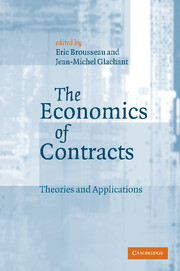Book contents
- Frontmatter
- Contents
- List of figures
- List of tables
- List of contributors
- Acknowledgments
- Part I Introduction
- Part II Contracts, organizations, and institutions
- Part III Law and economics
- Part IV Theoretical developments: where do we stand?
- Part V Testing contract theories
- Part VI Applied issues: contributions to industrial organization
- 18 Residual claims and self-enforcement as incentive mechanisms in franchise contracts: substitutes or complements?
- 19 The quasi-judicial role of large retailers: an efficiency hypothesis of their relation with suppliers
- 20 Interconnection agreements in telecommunications networks: from strategic behaviors to property rights
- 21 Licensing in the chemical industry
- Part VII Policy issues: anti-trust and regulation of public utilities
- Bibliography
- Index of names
- Subject index
18 - Residual claims and self-enforcement as incentive mechanisms in franchise contracts: substitutes or complements?
Published online by Cambridge University Press: 16 January 2010
- Frontmatter
- Contents
- List of figures
- List of tables
- List of contributors
- Acknowledgments
- Part I Introduction
- Part II Contracts, organizations, and institutions
- Part III Law and economics
- Part IV Theoretical developments: where do we stand?
- Part V Testing contract theories
- Part VI Applied issues: contributions to industrial organization
- 18 Residual claims and self-enforcement as incentive mechanisms in franchise contracts: substitutes or complements?
- 19 The quasi-judicial role of large retailers: an efficiency hypothesis of their relation with suppliers
- 20 Interconnection agreements in telecommunications networks: from strategic behaviors to property rights
- 21 Licensing in the chemical industry
- Part VII Policy issues: anti-trust and regulation of public utilities
- Bibliography
- Index of names
- Subject index
Summary
Introduction
Franchising is a contractual relationship that has received a significant amount of attention in the empirical literature on contracting. In large part, this is because franchising is one of the few types of contractual relationships about which significant amounts of data are available from public sources. But franchising is also, as noted by Williamson (1991), a hybrid organizational form, which lies somewhere between complete vertical integration and spot markets. Thus insights gleaned from the study of franchise contracting have allowed researchers to develop a better understanding not only of this organizational form, but also of how firms organize their activities much more generally, both within and across firms.
Much of the literature on franchising has specifically been concerned with incentive issues and how these are managed in these contracts. This literature has identified two main categories of incentive mechanisms relevant to the franchise relationship: residual claims and self-enforcement. The former relates to the fact that franchisees get to keep their outlet's profits net of the fees they pay to their franchisors, giving them incentives to maximize those residual profits. The second relies on the presence of on-going rent at the outlet level, rent that the franchisee forgoes if his contract is terminated. Such rent is simply the difference between the (net present value of) returns that the franchisee earns as a result of being associated with the franchise network and the returns he could garner in his next best alternative. If the rent is positive, and franchisors can terminate franchisees, franchisees will have incentives to perform according to the standards set by the franchisor to reduce their chances of termination and protect their access to the rent.
- Type
- Chapter
- Information
- The Economics of ContractsTheories and Applications, pp. 315 - 336Publisher: Cambridge University PressPrint publication year: 2002
- 6
- Cited by

